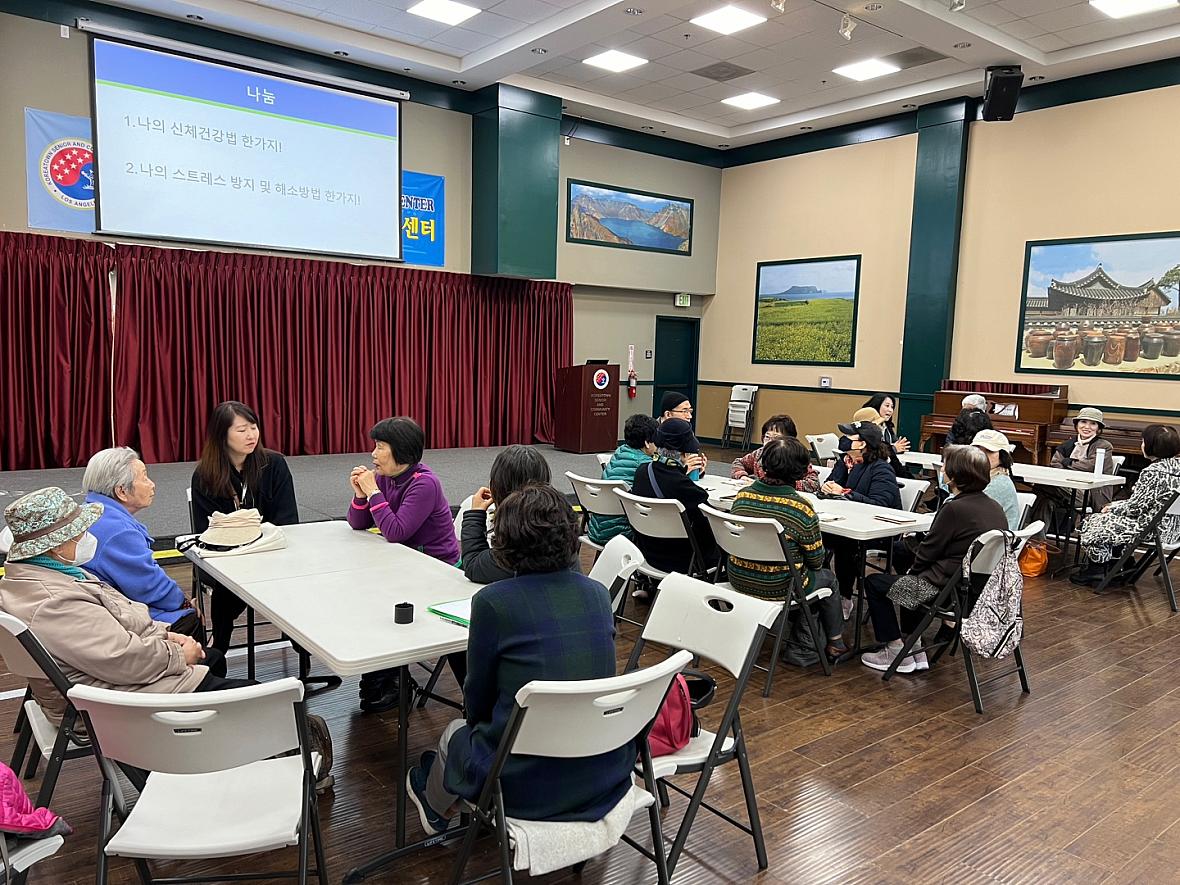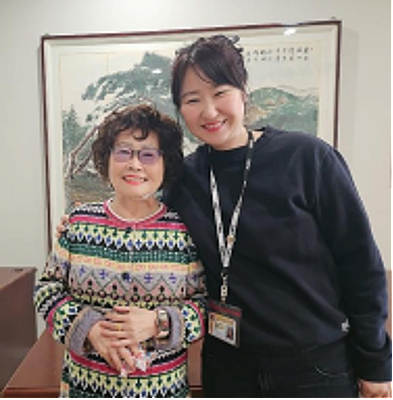Koreans in LA Gather in a Chat Room to Address Mental Health Issues
The story was co-published with The Korea Daily as part of the 2024 Ethnic Media Collaborative, Healing California.

Koreans opened up in a Chat Room set up by the Los Angeles
County Department of Mental Health.
Hyoungjae Kim, The Korea Daily
“Let’s shout together, ‘I’m doing well, I’m doing well!"
At 10 a.m. on February 8, around 20 Koreans assembled in the second-floor auditorium of the Koreatown Senior and Community Center in Los Angeles (KSCCLA). Their voices rang out powerfully during the gathering. Every Thursday morning, they come together in this Chat Room and share what’s on their minds led by three Korean mental health promoters from the Los Angeles County Department of Mental Health (LACDMH).
For first-time attendees, the group’s name felt welcoming. “We don’t ask questions; we just talk about our worries and frustrations,” said Kyunghee Choi, 91. “During the pandemic, I was stuck at home, lost my memory, and felt depressed, almost like it was dementia. Since coming to the Chat Room in April last year, I’ve gotten better,” she said, laughing.
Sook Hee Hong (pseudonym, 60), who suffered from severe depression said she endured it alone till her emotions exploded. "I was scared of anger outbursts to the point where I wondered if my life was always this way,” Hong said, adding, “I felt much better after expressing my pain little by little in the Chat Room.”
The Chat Room, started by the KSCCLA and LACDMH, aims to prevent and treat depression and provide mental health education and counseling to Koreans. Over the past year, mental health promoters Namjin Choi, Danah Kim, and Younghwa Choi from the LACDMH have been organizing events to raise awareness about the importance of mental health and help individuals discuss their concerns and find healing, guided by weekly themes.
On this day, the attendees were divided into three teams. The topic was “How to prevent and relieve stress.” Participants were not asked their names, ages, where they live, or what they do. It was a “rule” to ensure anonymity and discourage comparisons among each other. When one or two people shared their problems, they were met with empathy. They felt that they weren't the only ones struggling, many said.
Jihee Kim (pseudonym, 50s) said that after her mother died, she was unable to function. “I stayed in bed for over a year, hated eating and even meeting people. I realized I was in trouble, so I changed my mind and came to the meeting,” Kim said.
For Soon Yi Kim (pseudonym, 79), living alone in a three-story house for seven years took a toll. "My ears gradually became deaf, and my eyesight worsened, so I avoided meeting people and going to meetings. I was anxious and depressed because I thought I wasn’t smart, but I kept it to myself. I then joined a counseling group because I wanted to live, and now I eat a lot of food no matter what.”
Since the pandemic, there has been an increase in Koreans reporting mental health issues such as depression. According to the KHEIR Clinic in LA’s Koreatown, mental health consultations increased to 2,786 in 2023, up 34% from 2,080 in the previous year and nearly doubled from 1,542 in 2019.
“Depression and anxiety overwhelmingly dominated the types of consultations from 2019 to 2023,” the clinic reported, “with 320 depressive disorders and 252 anxiety disorders accounting for 75% of the total 769 diagnoses made by medical staff.”
Mental health counseling at the Korean American Family Services (KFAM) also surged by 60% from the previous year to 367 cases in 2023. Depression accounted for 34% of the total, with 125 cases. The Koreatown Youth & Community Center (KYCC), which provides mental health counseling to low-income individuals under the age of 25, also reported that 34% of its patients suffered from depression last year.
The LACDMH has called for active expression and counseling, noting that depression can lead to serious consequences, including suicide if left untreated. However, many Koreans are reluctant to disclose depression and other mental illnesses, which often exacerbates the situation.
“Koreans tend to keep their worries and depression to themselves,” said Younghwa Choi, a mental health promoter. “The health of themselves and their families should be prioritized more than their public image or the eyes of others. Depression is a cold of the heart, and if you treat it early enough, you can get better. There are various treatments available, so don’t be afraid to seek help,” she emphasized.
"I cured my heart disease in the chat room"
Grandma Lee Ok-shin

Okshin Lee (left), a grandmother who overcame severe depression, and Younghwa Choi, a promoter for the Los
Angeles County Department of Mental Health.
Hyoungjae Kim, The Korea Daily
As a first-generation immigrant, Ok-shin Lee, 76, has achieved the American dream financially. But for the past five years, she has suffered from severe depression, including insomnia and tremors in her hands and feet as a side effect of her depression.
"Because I was living a little more comfortably, people in need approached me and were very nice to me," she said.
"After we got to know each other, they asked to borrow money. I lent them $10,000, $20,000... $50,000 in total, but in the end, I was hurt and shocked when they said mean things to me."
The grandmother's kindness to others was rewarded with financial loss and public shunning. "I became depressed and my hands and feet were shaking because I got caught up in people asking me to borrow money. I was afraid to meet people because they said harsh things to me, and I couldn't shake off the words they used against me. I could only blame myself and stay at home, and that's how I got sick," she said.
After years of suffering, the elderly woman turned her life around with the advice and support of her husband. She knocked on the door of a support group set up by the Los Angeles County Department of Mental Health and the Senior & Community Center in Koreatown.
"When I first came to the group, I was embarrassed," she said, "I was cautious about revealing my feelings, but after receiving mental health education and counseling a year ago, I became more positive. I listened to what the teachers said and found my own comfort level." She found these conversations and counseling sessions to be healing, and came to realize the importance of mental health education in understanding and coping with depression.
She said that it was "not progressive to be ashamed of something that can be cured," adding that mental health education and counseling have helped her overcome her depression.
This Korea Daily project is supported by the USC Annenberg Center for Health Journalism, and is part of “Healing California,” a yearlong Ethnic Media Collaborative reporting venture with print, online and broadcast outlets across California.
